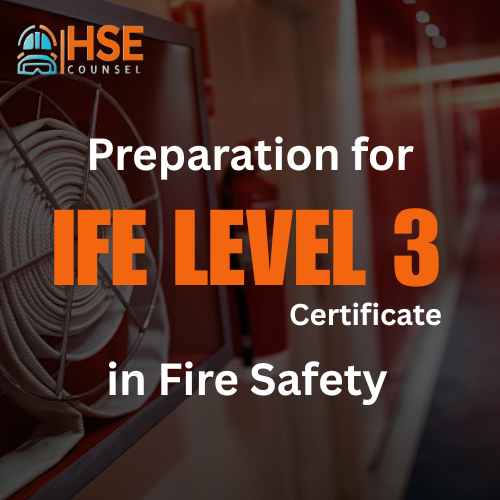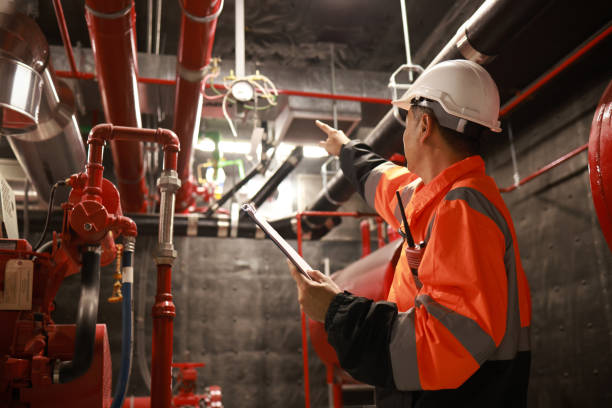Curriculum
- 5 Sections
- 111 Lessons
- 156 Weeks
- Understanding IFE Level 4 Certificate in Fire Safety1
- Building Construction42
- 2.1Timber – use in structure and in timber framed construction
- 2.2Concrete
- 2.3Steel
- 2.4Glass and fire rated glazing systems
- 2.5Building boards, building slabs and insulating materials
- 2.6Sandwich panels
- 2.7Fire retardant / fire resisting materials applied in different contexts
- 2.8External cladding
- 2.9Protected and unprotected steel columns
- 2.10Beams
- 2.11Walls – fire resistance, separation from adjacent properties
- 2.12Stairways
- 2.13Doors
- 2.14Windows
- 2.15Ceilings
- 2.16Building envelope
- 2.17Roofs
- 2.18Heating Systems
- 2.19Ventilation
- 2.20Air conditioning systems
- 2.21Stairwell pressurisation systems
- 2.22Ventilation and smoke control systems
- 2.23Electricity
- 2.24Oil
- 2.25Gas – Natural and Liquefied Petroleum Gas
- 2.26Biomass
- 2.27Water
- 2.28Photoelectric systems including micro generation
- 2.29Separating walls including corridors
- 2.30Compartment walls and floors
- 2.31Junctions formed by elements of structure
- 2.32Protected shafts and protecting structures – lifts and escalators
- 2.33Fire resisting doors and other enclosures
- 2.34Fire resisting ceilings
- 2.35Fire resisting partitions
- 2.36Active fire barrier systems
- 2.37Atria
- 2.38Building separation
- 2.39Fire stopping and cavity barriers
- 2.40Ductwork
- 2.41Dampers
- 2.42Quiz 1 – Building Construction5 Questions
- Fire Safety Principles and Fire Protection Equipment33
- 3.1Management Control
- 3.2Occupancy
- 3.3Construction
- 3.4Time of Evacuation
- 3.5Exits
- 3.6Travel Distance
- 3.7Place of Reasonable Safety / Place of Total Safety
- 3.8Dead End
- 3.9Protected Route
- 3.10ASET (Available Safe Egress Time) and RSET (Required Safe Egress Time)
- 3.11Pre-planning Arrangements for Ensuring the Safety of People
- 3.12Principles of Evacuation Procedures That Should Be Adopted in Case of Fire
- 3.13How the Behaviour of People in a Fire, or Potential Fire, Situation Can Adversely Affect Evacuation and Means of Escape
- 3.14How the Wellbeing of People Can Affect Evacuation e.g. Mobility, Disability, Health, Age, Size
- 3.15Personal Emergency Evacuation Plan (PEEP)
- 3.16The Purpose of Fire Precautions in the Protection of People and Property
- 3.17Use, Siting and Content of Fire Notices
- 3.18Use and Siting of Different Types of Extinguishing Systems Including Handheld Fire Extinguishers
- 3.19Use and Operation of Passive Fire Safety Systems in the Protection of People and Property
- 3.20Detection Systems: Smoke, Heat, Carbon Monoxide and Flame Fire Detection Systems
- 3.21Fire Warning Systems – Manual and Automatic
- 3.22Emergency Lighting Systems
- 3.23Principles That Apply to the Installation of Smoke Venting Systems
- 3.24Principles That Apply to the Installation of Fire Curtains
- 3.25Principles That Apply to the Installation of Fire Barriers
- 3.26Sprinkler Systems – Commercial, Residential, and Domestic
- 3.27Drencher and Water Spray Projector Systems
- 3.28Water Mist Systems
- 3.29Rising Mains – Dry Risers and Wet Risers
- 3.30Foam Systems
- 3.31Gas/Vapour Systems
- 3.32Dry Powder Systems
- 3.33Quiz 2 – Fire Safety Principles and Fire Protection Equipment5 Questions
- Fire Safety Review and Advice37
- 4.1Commercial Office Premises
- 4.2Retail Premises
- 4.3Factories and Other Places of Work
- 4.4Places of Public Entertainment Including Cinemas, Theatres, Dance Halls and Premises
- 4.5Alcohol Licensed Premises
- 4.6Hotels and Other Sleeping Accommodation Premises
- 4.7Health and Other Care-Related Premises
- 4.8Sports Grounds
- 4.9Flats/High-Rise Residential Buildings
- 4.10Safe Storage of Combustible Materials – Prevention and Control of Fires
- 4.11Large Outdoor Events
- 4.12Caravan and Camping Site Safety
- 4.13Petrol Filling Stations
- 4.14EV Charging Points
- 4.15Animal Premises and Stables
- 4.16Define the Terms “Hazards” and “Risks”
- 4.17How to Assess Hazards, Risks and Fire Precautions Within Different Areas of the Premises in Relation to Construction, Layout and Use
- 4.18How to Assess the Type and Level of Risk Associated with Different Hazards in Different Areas of Premises
- 4.19Identification of People Who May Be at Risk
- 4.20Identification of Risks to Property and the Environment
- 4.21Consequences of Failing to Identify Hazards and Control Risks
- 4.22Common Causes of Fire in Different Occupancies
- 4.23Identification of Suitable Options to Eliminate, Reduce or Control Risk in Different Types of Premises (Including Arson)
- 4.24How to Prioritise Risks and Solutions
- 4.25How to Review the Effectiveness of Control Measures
- 4.26How to Provide Feedback on the Effectiveness of Current Control Measures
- 4.27Assess the Requirements for Fire Protection and Determine Appropriate Solutions
- 4.28Training Needs of Workplace Staff
- 4.29Training Requirements for People with Fire Safety Responsibilities (Managers, Fire Wardens and Marshals)
- 4.30The Importance of Maintaining and Testing Installed Fire Safety Equipment and How the Testing Is Conducted
- 4.31Explain Fire Risks (Including Those Related to Arson) to Members of the Public and Property Owners/Managers
- 4.32How Fire-Related Incidents Can Impact on Business Continuity
- 4.33The Role of Building Managers in Protecting People and Property from the Risks of Fire
- 4.34Fire Hazards in the Community and the Promotion of Fire Safety Awareness Programmes
- 4.35Development and Implementation of Fire Safety Education Programmes in the Community
- 4.36How to Engage with Minority Groups Within Larger Community Areas
- 4.37Quiz 3 – Fire Safety Review and Advice5 Questions
- Preparing & Booking for Exams1




